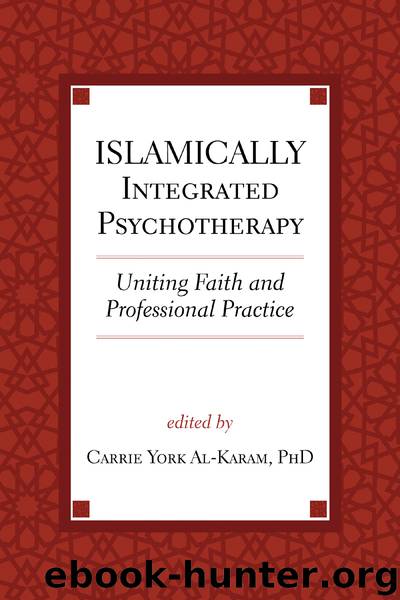Islamically Integrated Psychotherapy by Carrie York Al-Karam

Author:Carrie York Al-Karam
Language: eng
Format: epub
Publisher: Templeton Press
Exploring the Integration of Islamic Spirituality into Psychodynamic Therapy with Muslim Patients
REQUIREMENTS OF AN INTEGRATION OF SPIRITUALITY INTO PSYCHODYNAMIC THERAPEUTIC PRACTICES
According to the German guidelines of psychotherapy, psychodynamic therapy encompasses, “etiologically oriented therapeutic approaches, which treat unconscious psychodynamics of currently operating neurotic conflicts and structural disorders, while considering transference, counter-transference, and resistance. A concentration of the therapeutic process is pursued through limitation of the therapeutic goal, primary conflict-centered intervention, and restriction of regressive processes” (Federal Joint Committee, 2017, p. 12).
In this chapter, we rely on the framework of psychodynamic therapy and focus on psychoanalytical object relations theory in its most recent forms (Donald Winnicott, Ana-Maria Rizzuto), rather than on Freud’s original views. This framework proposes that the child’s access to the world and its people is shaped by the child’s relationships to early persons of reference, as the child fulfills basic needs for attention, contact, and to be held (Heine, 2007). As such, the ability to form relationships constitutes the fundamental element of the conception of human nature as propagated by object relations theory.
A novel understanding of the central notion of illusion has recently contributed to a mainly positive attitude toward religion. While Freud depicted religion as an illusion that humankind had to surmount during its process of maturation, today’s object relations theory conceptualizes illusion as a key human characteristic that “accompanies [humans] throughout their life and enables them to give life meaning and form, beyond its mere existence” (Santer, 2003, p. 198). This meaning and form include creativity, play, culture, and also religion.
From an Islamic perspective, humans are born with fitra, an innate, primordial orientation toward Allah (Mohamed, 1995; Skinner, 2010), and are always and above all relating to someone. Moreover, humans, as opposed to instinctual animals, have to learn relationships. This learning takes place during early childhood, predominantly in the family, and underlines the importance of early objects and persons of reference (Doering et al., 2017). Therefore, early experiences of relationships critically determine social relations and patterns of relationships in the long term, which take effect not only with respect to parents, family, and the environment but also toward Allah. This situation is influenced by patriarchal family and societal structures and, Islamically, by the tight intertwining of the parental relationship and Islamic texts. The texts include specific Quranic verses (e.g., 17:23; 46:15) and the Sunna (prophetic tradition), such as the prophetic saying that paradise lies under the feet of our mothers.
Frequently we experience a situation of diverging opinions between parents and their children, causing disrespect and, therefore, sinful behavior. This situation regularly possesses serious consequences for a person’s self-image as a Muslim and the person’s religious practice. As a further exemplification, a depressive patient who suffered from severe feelings of guilt and maintained a problematic relationship with his irascible and unpredictable father got to the heart of the problem by concluding, “If my father gets exasperated with me, then I have committed a sin.” He realized the implausibility of his statement only later in therapy.
Defining what Islamic actually
Download
This site does not store any files on its server. We only index and link to content provided by other sites. Please contact the content providers to delete copyright contents if any and email us, we'll remove relevant links or contents immediately.
Should I Stay or Should I Go? by Ramani Durvasula(7652)
Why We Sleep: Unlocking the Power of Sleep and Dreams by Matthew Walker(6701)
Fear by Osho(4727)
Flow by Mihaly Csikszentmihalyi(4687)
Rising Strong by Brene Brown(4449)
Why We Sleep by Matthew Walker(4434)
The Hacking of the American Mind by Robert H. Lustig(4375)
How to Change Your Mind by Michael Pollan(4355)
Too Much and Not the Mood by Durga Chew-Bose(4337)
Lost Connections by Johann Hari(4172)
He's Just Not That Into You by Greg Behrendt & Liz Tuccillo(3891)
Evolve Your Brain by Joe Dispenza(3671)
The Courage to Be Disliked by Ichiro Kishimi & Fumitake Koga(3488)
Crazy Is My Superpower by A.J. Mendez Brooks(3398)
In Cold Blood by Truman Capote(3374)
Resisting Happiness by Matthew Kelly(3337)
What If This Were Enough? by Heather Havrilesky(3308)
The Book of Human Emotions by Tiffany Watt Smith(3300)
Descartes' Error by Antonio Damasio(3270)
